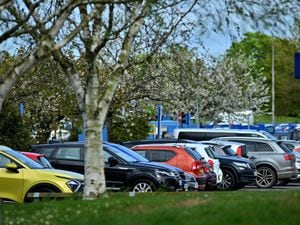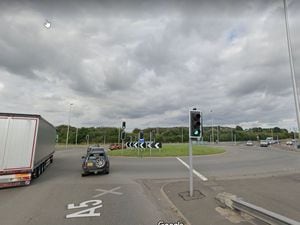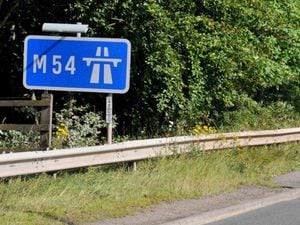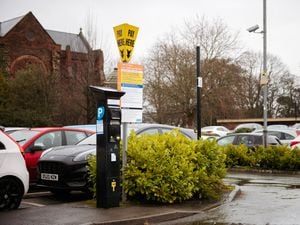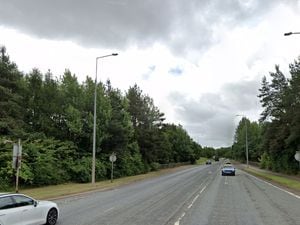Smart motorway schemes halted amid safety concerns but M6 project will continue
The roll-out of controversial smart motorways is to be paused amid safety concerns.
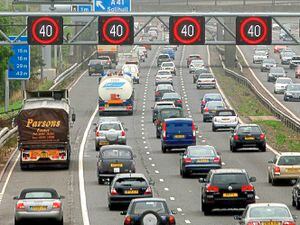
The 'all lane running' schemes will be halted until five years of safety data is available
The Department for Transport today said it is also investing £900 million to improve safety on existing smart motorways.
Large stretches of the M5 and M42 in the West Midlands have already had their hard shoulders removed to allow four lanes of traffic.
And a large stretch of the M6 in Staffordshire is nearing the end of a multi-million project to turn it into a smart motorway, joining other sections of the route further south in the West Midlands through the Black Country and Birmingham.
The DfT is responding to recommendations made by the Commons Transport Committee following concerns about the safety of motorists who break down or are involved in accidents.
It says that available data shows smart motorways are comparatively the safest roads in the country in terms of fatality rates.
But it says it will pause new projects and ensure current smart motorways without a permanent hard shoulder are equipped with "best-in-class technology and resources to make them as safe as possible".
The new measures will include an investment of £390 million to install more than 150 additional emergency areas so drivers have more places to stop if they get into difficulty. It says this will represent around a 50 per cent increase in places to stop by 2025, giving drivers added reassurance.
There have been a number of serious accidents involving vehicles stranded on the inside lane of smart motorways. Telford father Anthony Marston died after he was struck by a lorry when he stopped on the M6 to check his trailer in 2016. Lorry driver Michael Preston was jailed for 32 months for death by dangerous driving.
The DfT says it welcomes the Transport Committee’s report, which endorsed its focus on further upgrading the safety of existing ALR smart motorways rather than reinstating the hard shoulder. As concluded by the committee, evidence suggests hard shoulders do not always provide a safe place to stop, and by reducing motorway capacity, they could put more drivers and passengers at risk of death or serious injury if they were to divert onto less safe local roads.
Transport Secretary Grant Shapps said: “Pausing schemes yet to start construction and making multi-million-pound improvements to existing schemes will give drivers confidence and provide the data we need to inform our next steps. I want thank safety campaigners, including those who have lost loved ones, for rightly striving for higher standards on our roads. I share their concerns.”
National Highways CEO Nick Harris said: “We have listened to public concerns about smart motorways and we are fully committed to taking forward the additional measures the Transport Committee has recommended. While we pause those all lane running schemes yet to start construction we will complete the schemes currently in construction, we will make existing sections as safe as they can possibly be and we will step up our advice to drivers so they have all the information they need.
“We are doing this because safety is our absolute priority and we want drivers to not just be safer, but also to feel safe on our busiest roads.”
Independent road safety campaigner, Meera Naran, whose eight-year-old son Dev, died in a motorway crash on the M6 near Birmingham in 2018, said: “Conventional and smart motorways both have their risks and benefits. I welcome this pause in the roll-out of smart motorways which will give us all a positive opportunity to assess the future of our motorway network.
“I’m encouraged by the commitment of £900 million to improve the safety of our motorways, following my campaigning since Dev died. However, I’ll continue to both challenge and work alongside the Department for Transport to ensure even more is done, including calling for legislation to be looked at for Autonomous Emergency Braking and further support for on-going driver education."
While further data is being collected, National Highways will continue work to complete schemes that are currently in construction, including the M6, which will all open with technology in place to detect stopped vehicles. These schemes are all more than 50 per cent completed. Design work will also continue on those schemes already being planned, so they are ready to be constructed depending on the outcome of the pause. No preparatory construction work will take place.
Also, in line with the committee's recommendations, National Highways will pause the conversion of 'dynamic hard shoulder' motorways – where the hard shoulder is open at busy times – into all lane running motorways, while it investigates alternative ways of operating them to make things simpler for drivers. National Highways will also install technology to detect stopped vehicles on these sections.

